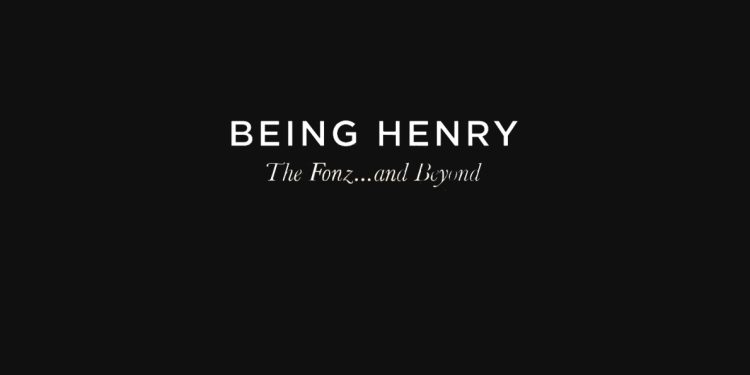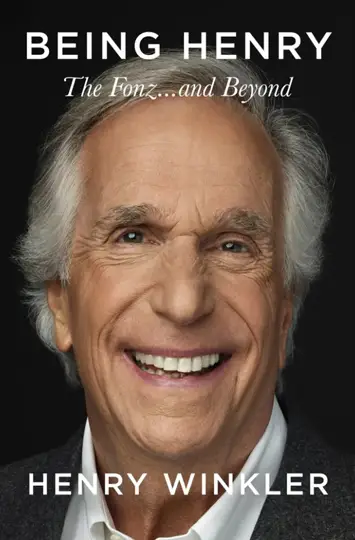Henry Winkler: The Fonz and Beyond (Audiobook) – Review

By Roger Crow
One of my favourite memories from years of celeb interviews was the time Henry Winkler spent 10 mins discussing his life story.
“What a pleasure!”, he remarked with genuine honesty as we started chatting. It left me hungry for more, and now I get to spend hours with the man who was an icon to millions.
His long-awaited autobiography has been on my pending list for months, and when it finally drops, I listen to about four hours in one sitting.
And it was well worth the wait.
We may think we all know the story of how a jobbing actor became an overnight star thanks to ‘that’ sitcom, but it soon becomes apparent that’s just the tip of a fascinating iceberg.
“Getting the acting bug”
Born of German-Jewish stock, Henry’s dad was smart enough to get his family out of harm’s way before the Nazis killed them. They settled in America, where young Henry was constantly berated for being unable to read. What they didn’t realise was he was dyslexic; it was a time when such a word meant nothing, and countless other students were deemed troublemakers or ‘dumb dogs’ because of their inability to read.
Anyway, skip to him getting the acting bug and that inevitable casting call to play Arthur Fonzarelli, the greaser bit-part character in sitcom Happy Days. Star of the show, Ron Howard, was a child actor who already had a decade’s experience under his belt by the time he played Richie Cunningham, the lovable protagonist at the heart of the comedy.
What nobody expected was how much the Fonz would take over the show. Winkler, having obvious trouble reading his scripts, would improvise some of the dialogue, and when questioned why, he would say he was capturing the ‘essence’.
His frustration with one script led to him cruelly hitting it. Howard took him for a walk one day and told him not to as the writers were doing their best with a tricky job. It gave Winkler a newfound respect for the writer’s craft.

“Notorious”
As the Fonz grew in popularity, the big cheeses wanted to change the title to ‘Fonzie’s Happy Days’. Winkler begged them not to as it would diminish the contribution of the rest of the cast. He got his wish.
There is a mention of how that notorious scene which became synonymous with a show outstaying its welcome. Winkler had mentioned to the producers that he was a pretty good water skier, and before long the Fonz was in California on water skis in a leather jacket, naturally, jumping over a shark.
Yes, that phrase ‘Jump the Shark’ eventually got picked up by a college kid, and suddenly everyone was saying this show or that show had reached THAT point in its upward trajectory, and the only way was down.
Inevitably Ron Howard felt more pushed out of the show which had meant to be a vehicle for him, so he went off to become a film director.
Ron and Henry remained firm friends throughout, though when Happy Days finally ended after a hugely successful run, typecasting had left Winkler in a tricky spot. Yes, he tried to break away from the cool Fonz image with films like Heroes, which he made with Harrison Ford, but it proved a hard job.
“Trial by fire”
Winkler’s private life, crashing at the houses of friends in California, including Charles Haid from Hill Street Blues, eventually led to him getting his own place. His romance and eventual marriage is revealed in great detail, partly by his wife, and there are a few cases of over sharing. Hey, it’s an autobiography, but as a guy who has spent some time in therapy, there’s a feeling that writing the book is also a sense of catharsis.
Fast forward to the 1980s and Ron Howard directs his old mate in a comedy called Night Shift with rising star Michael Keaton.
Winkler turns to directing, and though he has a great time helming a Dolly Parton movie, he has a trial by fire with Burt Reynolds, who frankly comes across as a bit of a nightmare. (Can’t help but feel Burt had a beef with Winkler for stealing some of his thunder during his heartthrob years).
Years later Henry is asked if he wants to direct a comedy called Turner and Hooch by one of Hollywood’s biggest cheeses. He jumps at the chance, but it’s clear the powers-that-be aren’t happy with his work and he’s fired.
He’s asked by Wes Craven to appear in Scream, and duly does so, but without a credit on the poster. However, he is asked to do Press, and obviously, the film is a huge hit.
“The odd curve ball”
The memory of the Fonz starts to fade as Henry ages like a fine wine. Eventually, he decides to dictate a story about a kid called Hank Zipzer, whose dyslexia makes him a pretty unique character in a world of kids’ literature. The books become hugely popular, but no US network wants to make a series about a dyslexic kid, so the show is made in Blighty by CBBC. Naturally, Henry makes an appearance, while fan Adam Sandler hires him for assorted films.
There’s also the odd curve ball of trivia. For years I’ve been impressed with former Corrie star Jessica Barden, who went on to make brilliant indie gems like Scarborough, and cult TV saga The End of the F****** World. She only went off to marry Henry’s son, which still blows my mind. Imagine having the Fonz as your father-in-law.
Apparently, many authors reading their own work for audiobooks are given a couple of days. Henry was given around 100 hours, and it’s that extra attention which really makes his autobiography shine as he savours every word, and occasionally gets carried away with those memories.
“We all wish we could be as cool as the Fonz”
I’ll never forget the day a Hollywood icon spent a few minutes telling me about his life and career, and there’s not much difference listening to the audiobook, especially his chapter about achieving success in the brilliant comedy-drama Barry, which finally landed him a coveted Emmy.
We all wish we could be as cool as the Fonz, even the man who breathed life into him. But Henry Winkler’s own degree of cool is to keep his feet on the ground when he’s one of the hottest stars in Hollywood. And also to stay sane in the years that followed, as well as triumphing over adversity and giving hope to countless young readers who had no idea what Happy Days was.
What a pleasure indeed.
Verdict? Ayyyy for effort, naturally.









